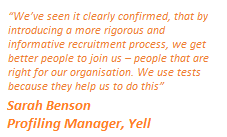
Understanding what 'good' looks like at Yell

The Challenge
For the international directories business Yell, success is dependant on the effectiveness of both its field and tele-based sales teams - so getting the right people in these roles is critical.
As one would expect, performance is managed closely and it was this that highlighted one of the key challenges facing Yell: first year performance post appointment. The attrition rate during this first year was around 36%. Yell sought to reduce this - and thereby retain the skill and knowledge in which it had invested - by developing a stronger recruitment process that enabled the recruitment mangers to identify and predict those that would succeed in their first year, and those that would not.
Yell's commitment to this is clear: Sarah Benson is Profiling Manager and her role is to focus on understanding what people need to do to do well in order to succeed - and how to both recruit and develop these skills.
Building this 'profile of success' was key. Benson explains,
“We wanted to tackle the issue of first year performance head on. But before we could do this, there needed to be an understanding of the differences between those that were seen as 'good' performers and those identified as being 'poor' performers.”
What does 'good' look like?
“We profiled the field and telesales communities in conjunction with our recruitment partner using a range of Getfeedback and other tools,” continues Benson.
“We wanted to build a recruitment process that gathered as much information as possible 'up front' to inform practically our selection decision.”
What they found was that the top performers were scoring stronger than the poorer performers in assessments of cognitive ability and in the behaviours 'creating empathy', 'empowering action', 'influence' and 'measuring and monitoring performance'.
Yell's intention was to build a profile of those that would succeed within the organisation and would contribute to the growth of the business. In addition to this, Yell built a recruitment process that is extremely thorough but is manageable for both the recruitment team and the candidates.
The new recruitment process
After the submission of their CV, all applicants take part in a telephone screening call taking them through a number of 'qualifying' questions which essentially confirms or negates whether he or she would be right for the Yell organisation and role. Following this, successful candidates are invited for a face-to-face interview which uses the Behavioural Event Interviewing (BEI) approach. This provides the interviewer with both the structure for the interview as well as a direct, quick route to understanding the experience and skills of the candidates. What's more, with the BEI approach providing such high reliability amongst the ratings of different interviewers, the recruiters at Yell can be sure that they are making the interview as objective as possible.

Psychometric assessments provide further objective information and are used across job roles both field and tele-based and for both internal and external candidates - including promotions. Yell has defined a range of tests and questionnaires that have shown to provide the extra information that they need both to feedback at final interview stage and to inform their decision. Yell uses Getfeedback's Orpheus, Intrinsic and Career Anchors questionnaire, along side other tests and add the Watson Glaser Critical Thinking Appraisal and RANRA for the managerial roles.
Employer brand
The candidate experience is important to Yell and it has invested time in looking at the recruitment process from the candidate perspective. Yell has chosen to use a bespoke 'Test Centre' - a Yell-branded portal specific to each role showing the tests and questionnaires that need to be completed.
“We believe it is important for the candidates to have a 'Yell' experience throughout the recruitment process - it emphasises the importance we place on the right process and procedure, continued communication and our commitment to getting the right people for us. Whatever the outcome of the selection process, we want applicants to feel as though they have been well-treated and fairly-treated.”, Benson comments.
The assessment results from the Getfeedback system feed into the Yell workflow system enabling a candidate profile to be held against each and every applicant.
The Results
In the two years since introducing assessment and defining the recruitment process, Yell has seen improvement both in retention of field sales - attrition rate falling by up to 2% - and an increase in performance of 5%. Given that these are sales roles, there are hard metrics against which performance is judged and the sales managers - the stakeholders in this recruitment - are keen to see proof that the process is working. And proof they have had.
“We've seen it confirmed clearly, that by introducing a more rigorous and informative recruitment process, we get better people to join us - people that are right for our organisation. We use tests because they help us to do this.“



